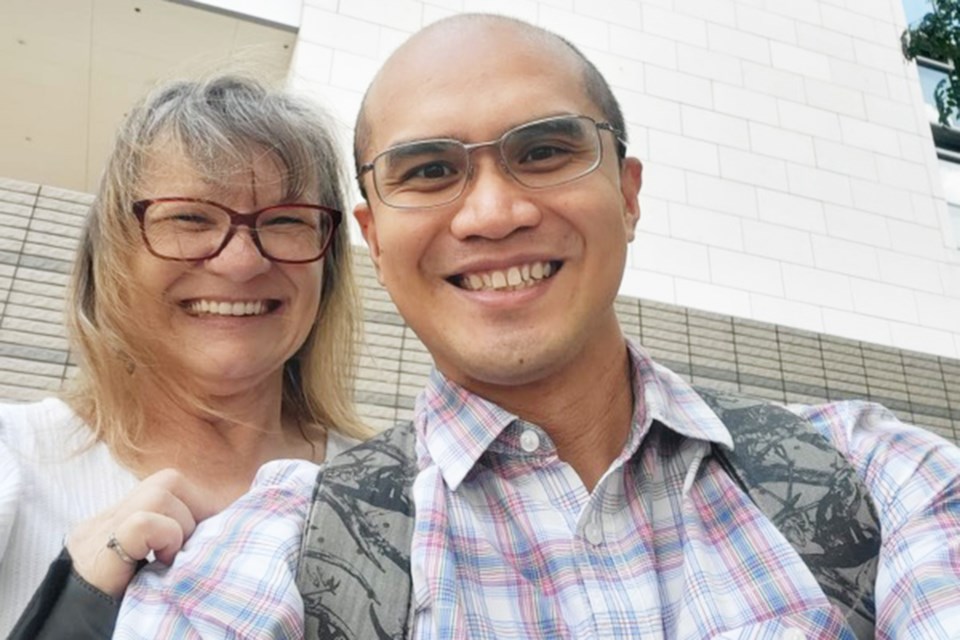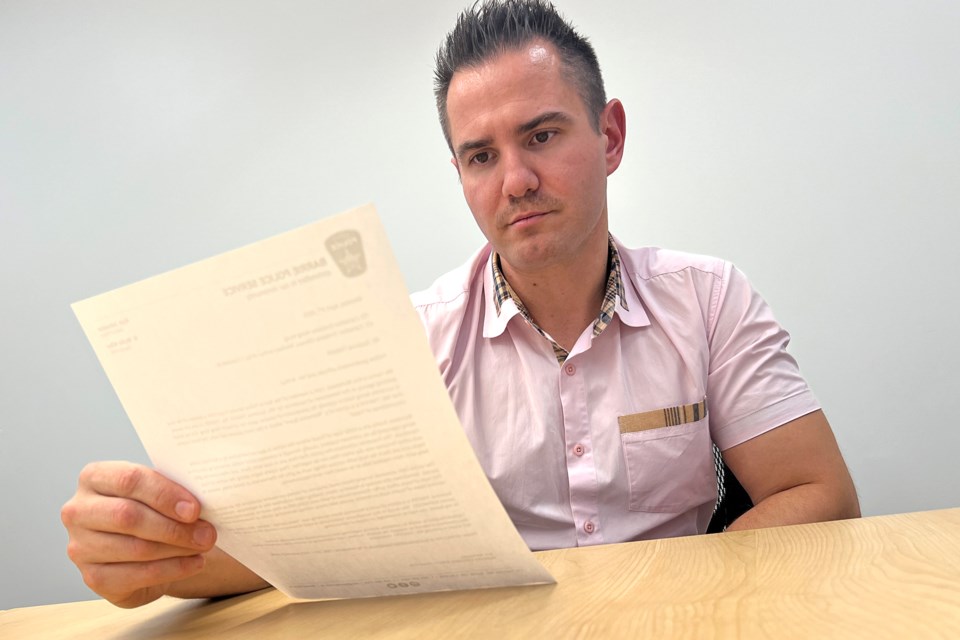Kristopher Nicholson, a detective-constable with the Barrie police fraud unit, certainly has his work cut out for him and the three other investigators in his office.
The unit sifts through hundreds of instances involving fraud per investigator in a single year.
The most infamous fraud case this year would be the story of Suzana Thayer, a Barrie resident who was detained in a Chinese prison for nine months, and was suddenly and unexpectedly released in May. She had been jailed in Hong Kong in September 2022 for allegedly smuggling cocaine into the country through the airport.
Thayer, the victim of an alleged romance scam, had travelled to Hong Kong to meet a man with whom she had developed a long-distance, online relationship.
She was initially duped into flying to Ethiopia from Canada, and then, eventually, to Hong Kong to meet the mystery man, but she never met him.
Instead, unbeknownst to her, she was handed a suitcase with cocaine hidden inside on the day she flew to Hong Kong, where she was then arrested by authorities.
Thayer’s daughter, Angela, called Barrie police on her mother’s behalf after her arrest. From there, Nicholson took on the case.
She explained to him the background story of her mother in an initial police report to get the ball rolling.
Nicholson sat down with BarrieToday to discuss the investigative side of the story.
A few things jumped out, he said, as he began his investigation.
“Obviously, the digital evidence, which we no longer had access to, (was a problem) because her iPad and phone and computer and everything were seized when she was arrested,” Nicholson said.
He said the prosecution office had asked for all the originals, “so (the family) had actually sent a lot of the electronics by airmail over to Hong Kong for their attention.”
He said he didn’t have the best source in regard to the digital evidence, so he was left with trying to get open source information from an organization such as Facebook, “which obviously isn’t reliable for a myriad of reasons.
“There’s no checks and balances or due diligence, if you will, as to what information you put on Facebook,” the detective added.
He said the suspect information online is going to be extremely hard to prove and equally as difficult to pinpoint based on the type of evidence they have.
“A lot of it was dated from months, if not years, ago, so a lot of the historical data isn’t always kept on Facebook or their servers,” Nicholson said. “And there is a huge information-sharing barrier with Facebook with it being an American company.”

Armed with the small amount of evidence Thayer’s daughter had sent him, he turned to other means.
“There was lots of security footage and video from the hotel that she was staying at when she was in Ethiopia, prior to her leaving that hotel, which is key for me,” Nicholson said.
“I was trying to determine things (and) trying to prove her innocence really relies on showing her intent on coming home.”
His strategy was to try to show Hong Kong authorities Thayer’s initial plane ticket in Ethiopia was for her return flight home.
“She had every intention of returning home to Canada, not going to Hong Kong, until that option was presented to her,” Nicholson said.
He said he was trying to couple the fact she had a return ticket to Canada and if he could match that with what he believed was the intent of the other men who showed up to the hotel and brought the suitcase to her.
“If I capture that on video, then that continues to further prove my theory that she wasn’t in possession of the suitcase her entire duration of her travel,” he added.
Nicholson said Thayer was in possession of the suitcase for a short period of time.
“They brought it to her when they were picking her up to take her to the airport, (and) she likely had it for less than a couple of hours — just in time for her to get it, take a few pictures to send to Angela, gather her belongings, get in the car, and get driven over to the airport,” he said. “That was my main focus. That was the only thing.”
The slow-moving wheels of justice in China continued with no answers.
Unanswered questions
Fast forward to May of this year, and Thayer was suddenly released from police custody with no explanation as to why.
“I thought perhaps it was due to the letter that I authored and sent to the embassy over there,” said Nicholson.
He also sent a copy of the letter to Michael Arthur, a lawyer based in Hong Kong who has experience in representing Canadians in custody there.
“My initial thought was maybe someone somewhere got a copy of this letter, or the video that surfaced. I don’t know exactly what happened,” Nicholson said.
“I was obviously relieved for the family. I know how much tremendous stress they were under, and I couldn’t imagine what it was like for Suzana being in custody in jail in a country that sometimes doesn’t have the highest regard for their own citizens, let alone visitors.
“I don’t think we’ll ever actually know the reasons why.”
The detective said police have made inquiries with the foreign authorities, but have received “a very deflected answer.”
“Authorities over there (are) basically saying, ‘We only prosecute what we have evidence to prosecute.’ I don’t know what the catalyst was,” Nicholson said.
He said he can relate to Thayer’s daughter, Angela.
“This could have easily been my mom or someone like a close loved one or a family member,” he said.
“It’s just so prevalent,” he added of the tidal wave of scams out there. “We have people at the station here, co-workers, where their parents are falling for grandparent scams or some other scam over the phone.”
His department tries to educate people and bring awareness to the problems of fraud.
“It affects everybody,” he said. “I’ve got 18- to 25-year-olds that are getting scammed on TikTok and Snapchat, and the middle-aged folks getting scammed with fraudulent mortgage claims, or clicking on (scam) links, or signing up for a water heater for your house, and it turns out to be a $300,000 lien on your home.”
Since the beginning of the pandemic in 2020, Nicholson has seen a huge influx in fraud cases in Canada.
“We have well over $600 million in losses this year,” he said of the numbers across the country, “and there is such a small percentage of people who report this crime — because of embarrassment or shame, or whatever emotional attachment you have when something like this happens to you. The numbers are grossly larger.”
Gone are the days of old-school fraud, he said, such as cheque frauds, sleight of hand, or forgery.
“I would say 90 to 95 per cent of what we deal with is all electronic,” Nicholson said.
“Romance scams — they are massive. They make up a huge percentage of the total fraud cases across the country.”
And the current status of the Suzana Thayer case?
“It’s currently closed right now, pending some more tangible suspect information. We still haven’t retrieved all of her electronics back from Hong Kong,” he said.
“The next steps would be trying to reach out, or unless you get some kind of anonymous tip coming from that country who can potentially identify who those people are. My top priority was to bring her home safely.”
One new lead that has surfaced recently, and that he is following up on, involves a person on Facebook who posted a comment on Thayer’s daughter’s page, saying they have information about the identity of the scammers.
A Facebook account named Ethical Andrew Paul left the following comment:
“it took me time to come clean, i am in Ethiopia i used to work with those Nigerians who scammed your mother. i am anonymous due to the fear of my life. the hotel manager at Yinm Furnished Apartments was compromised and deleted the alleged CCTV footage, but there's a copy that i am in possession of plus the identity of those Nigerians. if you are still interested in it inbox please. thank you.”
“That was brought to my attention,” Nicholson said about the post. “I have reached out to that person and I have yet to hear of a response.
“I suspect it will eventually lead to a blackmail piece where they might say, ‘I have the identity of the male involved and I know who did this, but If you send me money, I can tell you who it is.’”
So, his battle against fraud marches on, with the effort to combat it feeling like someone trying to push a boulder up a hill.
Nicholson said nothing makes him happier than charging people who are responsible for crime.
“But I kind of accept, given my experience with these types of cases and the evidence that I’m dealing with, the likelihood of me getting any tangible information is slim to none," he added.
“The fact we could get a release and get her home was a win.”




